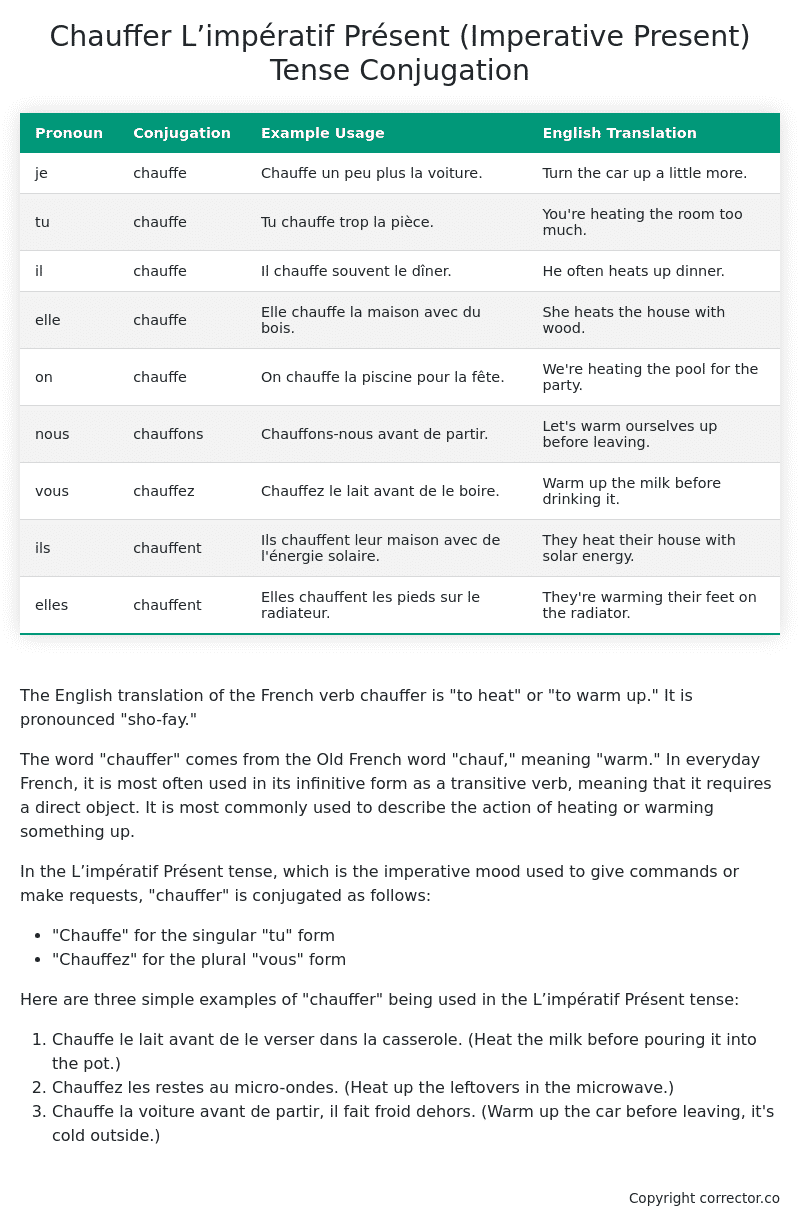L’impératif Présent (Imperative Present) Tense Conjugation of the French Verb chauffer
Introduction to the verb chauffer
The English translation of the French verb chauffer is “to heat” or “to warm up.” It is pronounced “sho-fay.”
The word “chauffer” comes from the Old French word “chauf,” meaning “warm.” In everyday French, it is most often used in its infinitive form as a transitive verb, meaning that it requires a direct object. It is most commonly used to describe the action of heating or warming something up.
In the L’impératif Présent tense, which is the imperative mood used to give commands or make requests, “chauffer” is conjugated as follows:
- “Chauffe” for the singular “tu” form
- “Chauffez” for the plural “vous” form
Here are three simple examples of “chauffer” being used in the L’impératif Présent tense:
- Chauffe le lait avant de le verser dans la casserole. (Heat the milk before pouring it into the pot.)
- Chauffez les restes au micro-ondes. (Heat up the leftovers in the microwave.)
- Chauffe la voiture avant de partir, il fait froid dehors. (Warm up the car before leaving, it’s cold outside.)
Table of the L’impératif Présent (Imperative Present) Tense Conjugation of chauffer
| Pronoun | Conjugation | Example Usage | English Translation |
|---|---|---|---|
| je | chauffe | Chauffe un peu plus la voiture. | Turn the car up a little more. |
| tu | chauffe | Tu chauffe trop la pièce. | You’re heating the room too much. |
| il | chauffe | Il chauffe souvent le dîner. | He often heats up dinner. |
| elle | chauffe | Elle chauffe la maison avec du bois. | She heats the house with wood. |
| on | chauffe | On chauffe la piscine pour la fête. | We’re heating the pool for the party. |
| nous | chauffons | Chauffons-nous avant de partir. | Let’s warm ourselves up before leaving. |
| vous | chauffez | Chauffez le lait avant de le boire. | Warm up the milk before drinking it. |
| ils | chauffent | Ils chauffent leur maison avec de l’énergie solaire. | They heat their house with solar energy. |
| elles | chauffent | Elles chauffent les pieds sur le radiateur. | They’re warming their feet on the radiator. |
Other Conjugations for Chauffer.
Le Present (Present Tense) Conjugation of the French Verb chauffer
Imparfait (Imperfect) Tense Conjugation of the French Verb chauffer
Passé Simple (Simple Past) Tense Conjugation of the French Verb chauffer
Passé Composé (Present Perfect) Tense Conjugation of the French Verb chauffer
Futur Simple (Simple Future) Tense Conjugation of the French Verb chauffer
Futur Proche (Near Future) Tense Conjugation of the French Verb chauffer
Plus-que-parfait (Pluperfect) Tense Conjugation of the French Verb chauffer
Passé Antérieur (Past Anterior) Tense Conjugation of the French Verb chauffer
Futur Antérieur (Future Anterior) Tense Conjugation of the French Verb chauffer
Subjonctif Présent (Subjunctive Present) Tense Conjugation of the French Verb chauffer
Subjonctif Passé (Subjunctive Past) Tense Conjugation of the French Verb chauffer
Subjonctif Imparfait (Subjunctive Imperfect) Tense Conjugation of the French Verb chauffer
Subjonctif Plus-que-parfait (Subjunctive Pluperfect) Tense Conjugation of the French Verb chauffer
Conditionnel Présent (Conditional Present) Tense Conjugation of the French Verb chauffer
Conditionnel Passé (Conditional Past) Tense Conjugation of the French Verb chauffer
L’impératif Présent (Imperative Present) Tense Conjugation of the French Verb chauffer (this article)
L’infinitif Présent (Infinitive Present) Tense Conjugation of the French Verb chauffer
Struggling with French verbs or the language in general? Why not use our free French Grammar Checker – no registration required!
Get a FREE Download Study Sheet of this Conjugation 🔥
Simply right click the image below, click “save image” and get your free reference for the chauffer L’impératif Présent tense conjugation!

Chauffer – About the French L’impératif Présent (Imperative Present) Tense
Usage
Giving commands
Making requests
Offering advice
Expressing desires
Conjugation Formation
Interactions with other tenses
Want More?
I hope you enjoyed this article on the verb chauffer. Still in a learning mood? Check out another TOTALLY random French verb conjugation!


